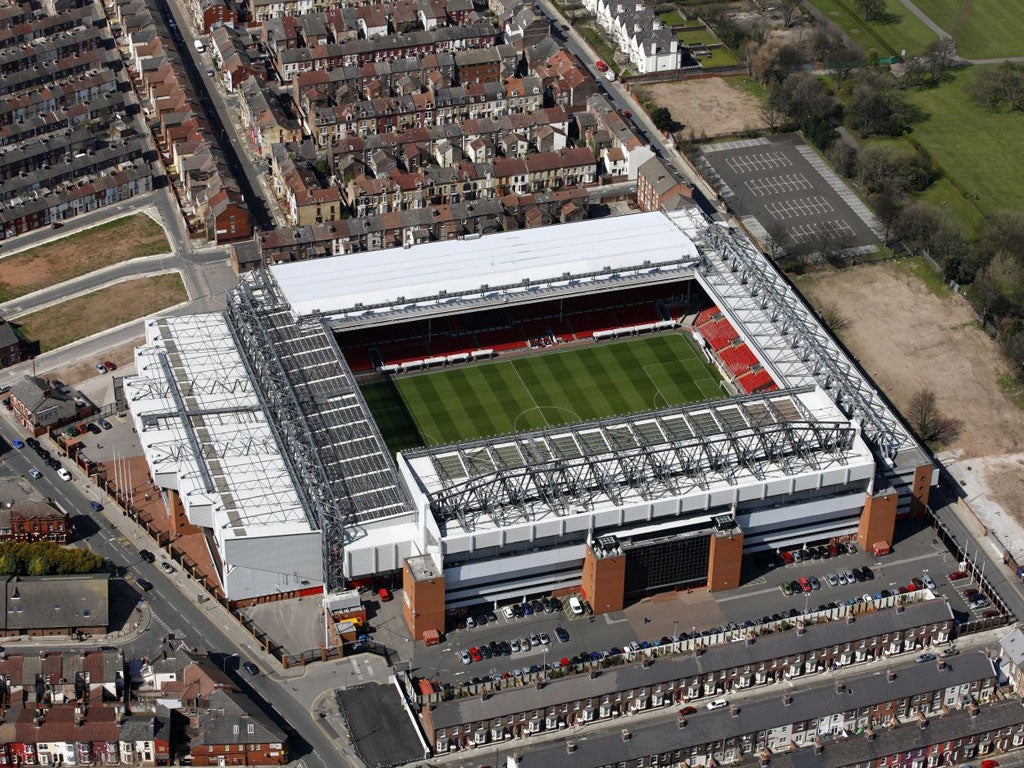Liverpool decide on extending Anfield 'spiritual home'
American owners reject new stadium in favour of £150m development to reach 60,000 capacity

Your support helps us to tell the story
From reproductive rights to climate change to Big Tech, The Independent is on the ground when the story is developing. Whether it's investigating the financials of Elon Musk's pro-Trump PAC or producing our latest documentary, 'The A Word', which shines a light on the American women fighting for reproductive rights, we know how important it is to parse out the facts from the messaging.
At such a critical moment in US history, we need reporters on the ground. Your donation allows us to keep sending journalists to speak to both sides of the story.
The Independent is trusted by Americans across the entire political spectrum. And unlike many other quality news outlets, we choose not to lock Americans out of our reporting and analysis with paywalls. We believe quality journalism should be available to everyone, paid for by those who can afford it.
Your support makes all the difference.Liverpool yesterday confirmed their plans to redevelop Anfield rather than build a new stadium. Managing director Ian Ayre said the club's American owners would expand the stadium and revamp the surrounding area in a partnership with Liverpool City Council.
On the second anniversary of Liverpool's acquisition by the Fenway Sports Group, Ayre officially stated their commitment to Anfield rather than a new ground in Stanley Park.
"LFC celebrated its 120th year in 2012 at Anfield and there is no doubt Anfield is the spiritual home of the club," he said yesterday morning. "Our preference was always to remain at Anfield. This is a major step forward for the football club, but more importantly the residents."
Ayre recalled when Liverpool's owner, John W Henry, first saw Anfield. "I was the person who showed John around Anfield the first time they ever came to Liverpool. We were in the tunnel area at Anfield and I remember him saying to me, 'Why would we want to build a new stadium? This is like Fenway. This is the home of Liverpool Football Club.'" Henry also owns the Boston Red Sox, who have stayed at their traditional home of Fenway Park rather than building a new ground.
The hope at Liverpool is to extend Anfield's capacity from 45,276 to 60,000, with extensions to the Main Stand and Anfield Road end, depending on planning permission. Liverpool are not likely to make a planning application until next summer, and will have to clear some of the streets around Anfield as part of the work.
Ayre believes that the club will save money by avoiding building a new stadium. The work on Anfield is expected to cost approximately £150m, while a new ground would have cost over £400m to build.
"Over the last two years one of the things that we've had to do, and was important to do, was analyse the detail of what works, what doesn't work, what the economical situation is for either solution," he explained. "If you build a new stadium, for example, one of the big challenges is that you don't get 60,000 new seats in a new stadium, you only get the difference. That makes it very difficult to make it viable because the cost of building such a big new stadium doesn't work economically, particularly in this market."
"The work we've done on that showed us that as long as we could find the right solution to stay at Anfield, and get through the barriers and hurdles that we needed, we would have to find the best long-term solution for the club."
Join our commenting forum
Join thought-provoking conversations, follow other Independent readers and see their replies
Comments